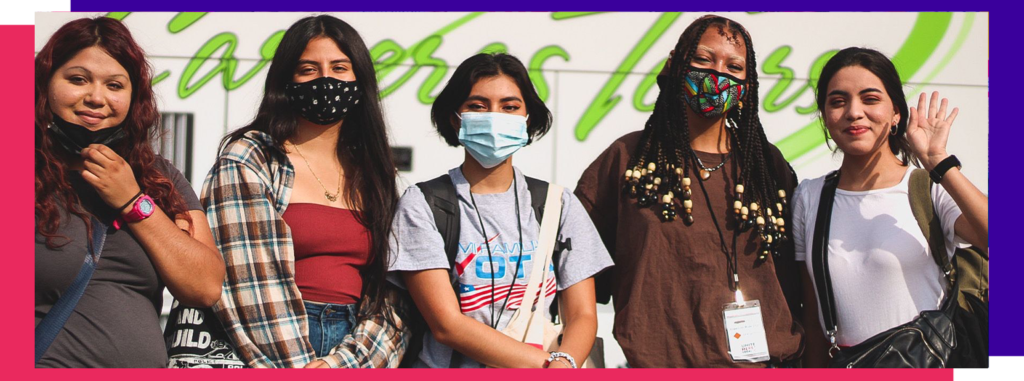
Here is what we the funders, more established civic engagement groups, and all those supporting grassroots organizing could do to confront the challenges and kick open the door to a more vibrant, inclusive, and successful movement building nationwide.
YEF’s youth civic engagement collaboratives are a model for what youth-centered civic engagement spaces could look like. Our collaboratives are state-based strategic organizing hubs first established in Arizona and Georgia in 2021. They center young people of color-led organizations in efforts to expand the electorate by mobilizing young voters – many of whom are first time, immigrant, or low propensity voters in communities of color. They lead voter engagement campaigns inexorably tied to issue-based organizing campaigns focused on reproductive justice, overhauling immigration, education reform, criminal justice, and climate justice. The goal of the collaboratives is to make life-long activists out of young leaders and to amplify the impact of youth organizing on the larger political landscape. To achieve this, we have partnered with experts on best practices, trends, and strategies to invest in youth civic engagement. The youth civic engagement collaborative model provides opportunities for young people to exercise leadership, set priorities, make strategy decisions, and build organizations on their own terms.
The pressures on young leaders of color and the relative newness of so many of these organizations – all but 3 of the organizations that responded to our demographic survey were founded in the last 10 years – means that extra support is needed to help these organizations stabilize and allow them to thrive. It is imperative that philanthropy adjusts giving practices to facilitate long-term sustainability of youth of color-led civic engagement organizations.

Texas: Due to the sheer size of Texas, investments are necessary to scale existing programs and incubate new organizations, especially in rural areas and along the U.S. Mexico border. Conversations on the ground reveal the potential for a lot more collaboration and energy in youth organizing. The Texas Youth Power Alliance is a coalition that includes Texas Rising, JOLT, Youth Rise Texas, and MOVE Texas. Their goal is to bring youth organizing to scale across the state. They focus on making sure young people are represented at coalition tables and are currently developing a youth justice agenda with shared issue areas for their next legislative session. They have also initiated training for youth organizers throughout the state. Into 2022, TYPA members are working closely with YEF staff and consultants to scale their existing coalition efforts into a state youth table where youth organizations can meet and grow to provide targeted and coordinated outreach to the many communities in and outside of urban areas in the state. We envision a strong youth table dedicated to building resilient youth power to boost existing narrative change work, win at the local and municipal level, and protect the right to vote for generations of Texans to come.
New Mexico: New Mexico is ripe for a youth civic engagement collaborative. The New Mexico Dream Team is the state’s only youth-led statewide organization; they are multi-generational in focus though youth-led, and they are the first to say that creating a purely youth-centered space would be of great value in coordinating youth organizing efforts around structural reform efforts. They want a hub where youth organizations could strategize and collaborate together to make meaningful changes in key cities to test progressive policies. Establishing a youth-centered space could make space for more transformational policy and movement building in the state, which could help to shift the state’s nonprofit sector into advocating for larger structural changes primarily in criminal justice, education, and immigration policy. Similar to Arizona and Georgia, a New Mexico youth collaborative could be a place where people could share trainings on grassroots organizing, learn how to build strategic campaigns, and find motivation and support.
Arizona: Like New Mexico, people familiar with One Arizona often describe the organization as being a youth-centered civic engagement space. This may be because they have a young POC leader and a strong commitment to organizing young people. But creating a Youth Power Coalition dedicated to youth civic engagement is still something that One Arizona is cultivating rather than something they have firmly in place. They have a staff person assigned and ideas about how they could use such a space to enhance their organizing efforts, but are hoping for the opportunity to meet with other organizations who have done this or who are also getting started with it. Investments in this emerging youth table are critical to sustain development and scale shared program and outreach goals. Arizona’s youth organizing landscape is relatively stronger than other South and Southwestern states, with more coordination and overall capacity, though primarily focused in urban areas. Providing increased investment and attention to infrastructure in this state would increase coordination and outreach capacity to ensure youth organizations reach the greatest number of young Arizonans.
Georgia: Georgia did not have a coalition space specifically for youth civic engagement organizations, a reason why YEF established one of the first Youth Civic Engagement Collaboratives in 2021. Although Georgia has programs and organizations that are dedicated to this work, there was nowhere for youth to actually develop their own agenda and convene with others doing this work. For some of the groups organizing around youth civic engagement, making sure that the youth space is politically aligned around transformational lens, including Black and queer liberation, was important to their willingness to participate, and became an important point of discussion as they plan this new effort. Throughout 2021, YEF staff worked with ProGeorgia leadership to ensure the space was welcoming to and led by Black and queer youth of color. Investments in this collaborative effort hold the potential to expand on current electoral success and resource some of the most directly impacted groups by our broken democracy.
